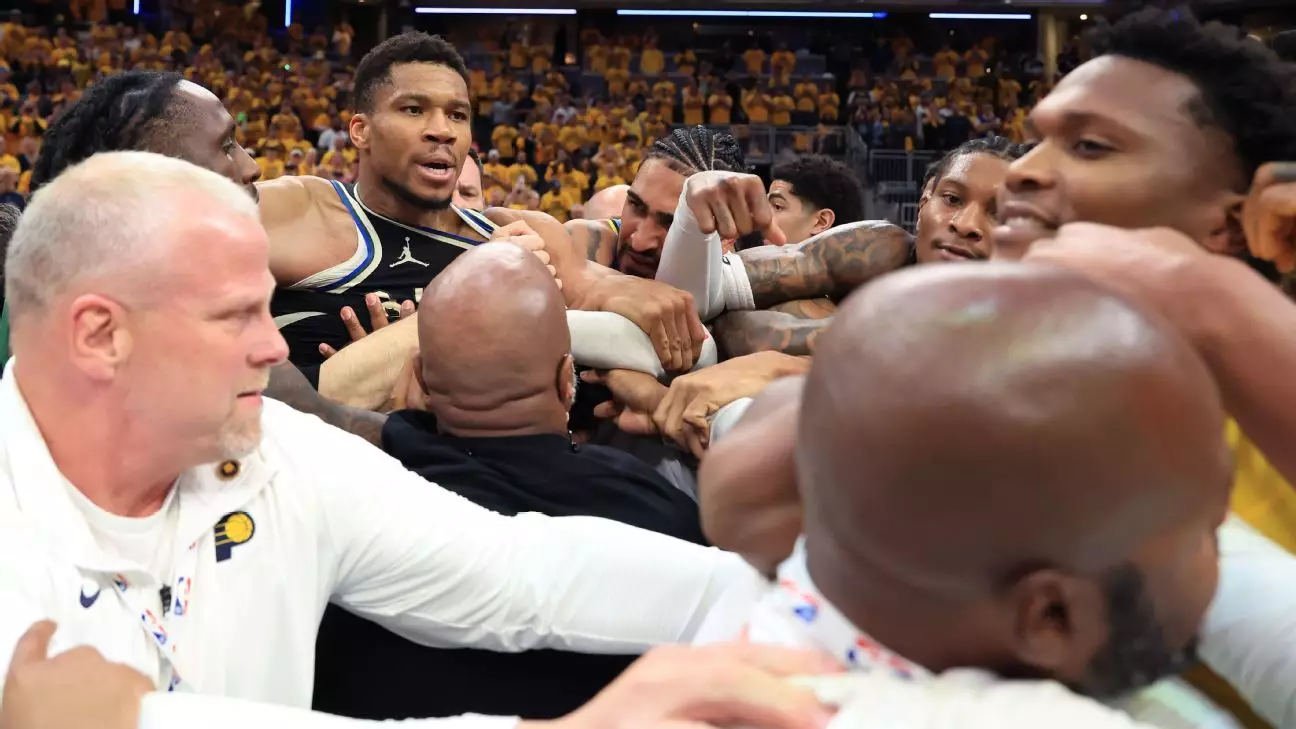A Clash of Emotions Giannis and the Haliburton Family’s Controversial Showdown
Hey there, fellow sports lover! Have you ever been so caught up in the excitement of a game that your emotions just took over? I know I have. The thrill of a close match can make anyone’s heart race, but sometimes those emotions spill over in unexpected ways. Today, we’re diving into a story where emotions ran high: the recent showdown between Milwaukee Bucks star Giannis Antetokounmpo and the family of Indiana Pacers player Tyrese Haliburton.
Picture this: it’s a crucial playoff game, and tensions are high. The Indiana Pacers clinch a nail-biting 119-118 victory over the Milwaukee Bucks in overtime. As fans, we’re all familiar with how intense these moments can be. But what unfolded next was a spectacle nobody could have predicted—a clash that highlighted the thin line between passion and respect.

This story isn’t just about the players on the court; it’s about what happens when family members step into the fray. It raises questions about sportsmanship and the roles our loved ones play in our professional lives. How far should family involvement go? Let’s dig deeper into this emotional encounter and see what we can learn.
Key Takeaways
- The incident highlights the complexity of family involvement in professional sports.
- Giannis Antetokounmpo’s response underscores the importance of respect and decorum.
- The event opens discussions around sportsmanship and emotional control.
The Context Behind the Showdown
The game between the Bucks and Pacers was one for the books. It was an emotional rollercoaster from start to finish, culminating in Tyrese Haliburton’s incredible game-winning layup in the final seconds. For many, this should have been a moment of pure joy for Haliburton and his family. However, things took a different turn when his father, John Haliburton, couldn’t contain his excitement.
John approached Giannis on the court, expressing his elation in what Giannis felt was an inappropriate manner. It wasn’t just about being happy for his son; it was about crossing boundaries that are typically respected in competitive sports. This incident sparked much debate about where we draw the line between familial support and unsportsmanlike conduct.

Giannis’ Perspective
Giannis Antetokounmpo is known not just for his athletic prowess but also for his humility and sportsmanship. So, it was no surprise that he took issue with John Haliburton’s actions. In post-game interviews, Giannis expressed disappointment, highlighting how celebratory antics often border on disrespect. His comments weren’t just about this one incident; they were a broader critique of current sports culture.
For Giannis, winning isn’t just about scoring points—it’s about maintaining integrity on and off the court. His stance challenges a growing trend where exuberance overshadows grace and respect. By speaking out, Giannis is advocating for a return to core values in sportsmanship, reminding us that success shouldn’t come at someone else’s expense.
The Fallout and Reflection
The aftermath of this confrontation had ripple effects both on and off the court. Tyrese Haliburton himself addressed the situation, acknowledging that his father’s behavior crossed a line. He emphasized that while excitement is natural, it should remain within respectful bounds. This moment serves as a poignant reminder of how closely linked families are to their athlete relatives’ public personas.
John Haliburton later issued an apology, recognizing that his actions could have broader implications beyond just one game. It’s not easy to admit faults publicly, especially when emotions are involved, but doing so demonstrates accountability—a quality that’s crucial in maintaining healthy relationships within any community, including sports.

Shifting Sports Narratives
This incident with Giannis and John Haliburton is more than just a headline; it’s an opportunity to rethink how we view sportsmanship today. Too often, we see instances where victory celebrations morph into unsportsmanlike behavior—whether it’s from athletes themselves or their supporters. We need to ask ourselves: what kind of message do we want to send?
Sports should be a platform for showcasing talent and hard work while respecting opponents. Victory moments should celebrate achievement without degrading others or inciting rivalries unnecessarily. By addressing these issues openly, figures like Giannis pave the way for positive changes within sports culture—changes that prioritize respect over spectacle.
Final Thoughts
In conclusion, while competition can be intense and emotions can run high during games, it’s essential to keep respect at the forefront of sportsmanship. Whether you’re on the court or supporting from the sidelines as family or fan, remember that sports are more than just about winning—they’re about embodying values like integrity and humility.
This clash between Giannis Antetokounmpo and John Haliburton invites us all to reflect on our own interactions within competitive environments—be it in sports or everyday life. Let’s strive to create spaces where passion coexists with dignity so that every victory feels truly worth celebrating.

Giannis Antetokounmpo
Tyrese Haliburton
sportsmanship
NBA playoffs
emotional control


Leave a Reply